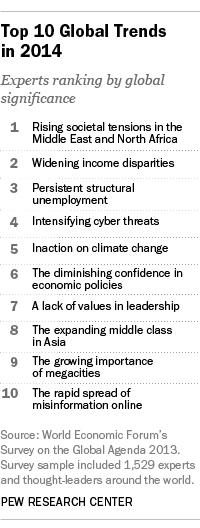
A new report from the World Economic Forum ranks the 10 most important global trends, based on a poll of 1,592 leaders from academia, business, government, and non-profits.
Here are some data points that compare and contrast the public’s views around the world with the trends identified by the experts.
1. Rising societal tensions in the Middle East and North Africa – People in this region were mostly dissatisfied with their country direction, according to the Pew Research Center’s survey of people across the globe this year. This includes particular disappointment in Lebanon (88% dissatisfied), the Palestinian territories (87%) and Tunisia (81%).
2. Widening income disparities – One of the most striking findings from our recent survey of general publics across the globe was the degree to which people see the gap between rich and poor as a major challenge. In 31 of 39 nations, half or more of those polled said inequality is a very big problem in their country.
3. Persistent structural unemployment – The spring survey found that two-thirds or more in most countries say a lack of employment opportunities is a very big problem. When asked which of the four issues – inflation, unemployment, inequality or debt – the government should address first, 22 of the 39 publics surveyed said jobs.
4. Intensifying cyber threats – U.S. policy experts were very concerned about the threat of cyber-attacks from China, according to our survey last year. However, while the World Economic Forum survey identified cyber threats as a top concern, 47% of experts admitted they have limited knowledge of the problem.
5. Inaction on climate change – A median of 54% or more of people surveyed in Canada, Europe, the Asia Pacific, Latin America and Africa saw global warming as a major threat to their countries, according to our global survey. However, only 40% of Americans and a median of 42% in the Middle East region regarded global climate change as a major concern.
6. Diminishing confidence in economic policies – In our polls conducted across the globe, people voiced widespread concerns about economic conditions in their countries. Indeed, attitudes were particularly grim in European countries, such as France (only 9% said good), 4% said the same in Spain, 3% in Italy and just 1% in Greece. Nevertheless, in emerging markets such as China, 88% of the people said their economy was doing well.
7. A lack of values in leadership – Between 2007 and 2012, confidence in Organization for Economic Co-operation and Development (OECD) national governments declined from 45% to 40% on average, making it difficult for national authorities to mobilize support for necessary reforms, according to a recent report by the OECD. In the U.S., public trust in government has fallen substantially since 1958 and is near an all-time low.
8. The expanding middle class in Asia – More than any other region, Asians are hopeful about the economic prospects for the next generation. In contrast to Asia’s relatively positive outlook, majorities in the United States, Canada, and throughout Western Europe believe the economic future will be worse for the next generation.
9. The growing importance of megacities – Life is increasingly lived in the world’s urban centers. According to the United Nations Population Division, more than half of the world’s population lives in urban areas. However, not all of the world’s regions are equally urban. Africa, for example, is predicted to reach 50 percent urbanization by 2035.
10. The rapid spread of misinformation online – One-third (30%) of the world’s youth have been active online for at least five years, according to the International Telecommunication Union. Social networking has also spread around the world. In 19 of 21 countries, about three-in-ten or more of those polled use sites such as Facebook, according to our survey last year.
Richard Wike, Director of Global Attitudes Research at the Pew Research Center, is tweeting from the 2013 Summit on the Global Agenda. You can follow him on Twitter @RichardWike #globalagenda.
